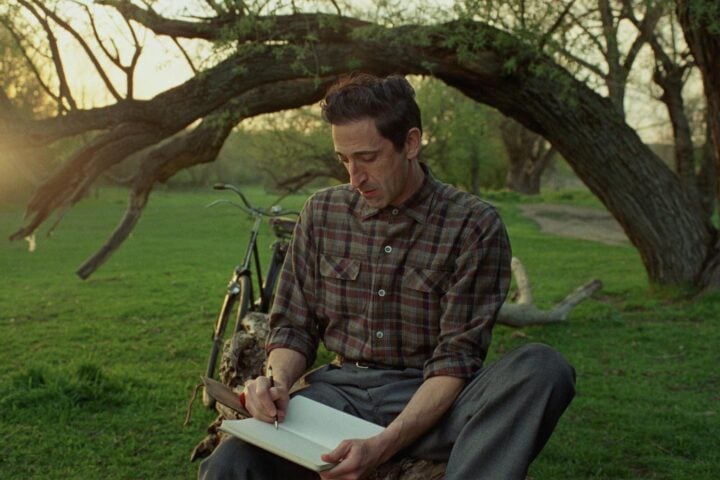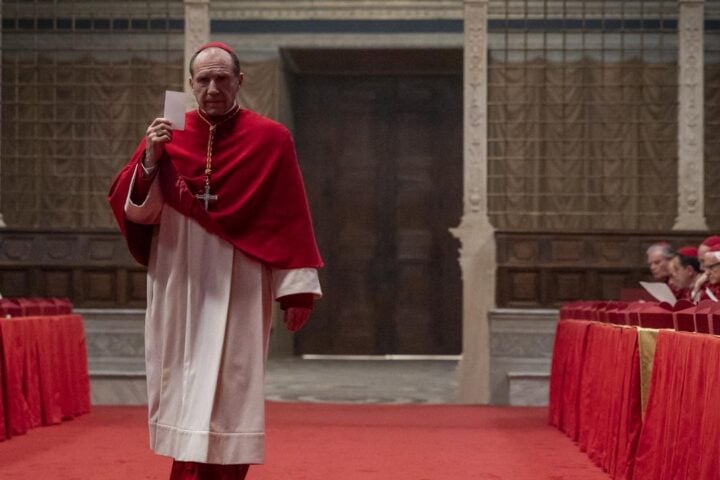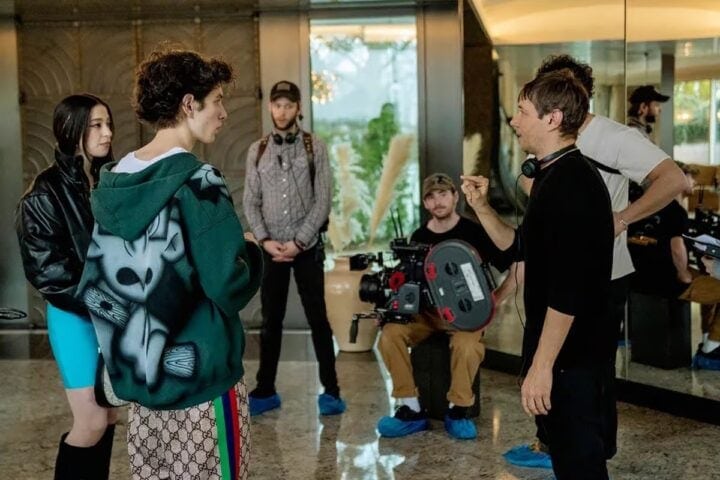From the moment he stumbled out of the Midwest and into Greenwich Village, Bob Dylan, né Robert Zimmerman, has blurred truth and fabulism in ways that resist the subsequent decades of obsessive study of his life and work. And the best attempts to unpack the artist, from Martin Scorsese’s willfully slippery documentaries to Todd Haynes’s cubist ciné-portrait I’m Not There, have engaged with this tall-tale aspect of Dylan’s life.
At first glance, James Mangold’s A Complete Unknown, an account of Dylan’s (Timothée Chalamet) arrival in New York and rapid ascent to folk stardom, ostensibly follows suit in accepting the mystery of this iconoclastic artist. On an early date with girlfriend Sylvie (Elle Fanning, playing a stand-in for Suze Rotolo), the pair see the film Now, Voyager, which she interprets as the story of a woman overcoming her past to become her true self. Dylan disagrees, saying that Bette Davis’s protagonist simply constructs a different identity divorced from her background. The subsequent identity is “not better, he insists, but “different.”
In short order, though, A Complete Unknown sticks to the usual biopic formula by sprinting through the most notable moments of Dylan’s life, from hitchhiking to New York in 1961 to meet his ailing idol, Woody Guthrie (Scoot McNairy), right up to the cusp of the 1966 motorcycle crash that would prompt a major stylistic pivot from folk icon to unpredictable troubadour.
To its credit, Mangold’s film never attempts to “solve” Dylan in terms of ascribing simple explanations for how this odd young man turned a marginal bohemian scene on its head and rapidly advanced pop music’s validation among the intelligentsia. But it offers nothing in place of this, defaulting to that biopic trope so impossibly stale that it was ruthlessly parodied nearly 20 years ago in Walk Hard: the subject conjuring a now-familiar classic seemingly out of thin air as lesser artists and hangers-on, frozen in awe, bear witness to greatness.
While even casual fans know of Dylan’s caustic mid-’60s persona, Chalamet intriguingly plays the musician with a shy, nervous quality that barely masks a superiority complex. When he first strikes up a relationship with Joan Baez (Monica Barbaro), Dylan dismisses her work as “pretty…almost too pretty,” comparing her flowery lyrics to technically correct but artistically bland hotel art. And seen through Dylan’s eyes, Pete Seeger (Edward Norton) is little more than a well-meaning but exhausting do-gooder whose idealism scans as gratingly naïve even to the artist two decades his junior. At times, Dylan’s dalliance with protest music is portrayed as little more than a cynical calculation on his part, something that he masters less out of conviction and more to make a name for himself before chafing to try something new.
This underlying tension propelling Dylan to the top of the Village folk heap makes the film’s first half its strongest, but it also elevates Dylan at the expense of his peers. When Joan swiftly adds his instant classics like “Blowin’ in the Wind” to her own repertoire, it feels less like an acknowledgement of folk music as a living, forever expanding tradition and more like an admission that Dylan’s judgment of her own songwriting is correct and that she’s riding his coattails. (In reality, Dylan’s career was boosted thanks to Baez’s championing of him.) Likewise, Seeger, a genuine icon of American music and a man willing to risk his freedom to stand up for civil rights, comes off as a patronizing geek who stifles Dylan’s creative flame well before the pressures of stardom inspired the singer to shake up his style.
In its second half, though, A Complete Unknown’s issues snowball as it rushes blindly through Dylan “going electric,” and to the point of incoherence. Chalamet leans heavily on Dylan’s antisocial flippancy as the man snipes at friends and antagonizes fans, but the actor inadvertently treats the singer’s movement toward rock as a gesture of defiance rather than a natural progression for a boy who once dreamed of playing in Little Richard’s backing band.
And the gleeful energy with which Dylan assembles electric instruments and a rock group rapidly dissipates as the film starts to play increasingly loose with the timeline, culminating in a baffling climax at the 1965 Newport Folk Festival. Significant enough in Dylan history as the point of no return of his break with folk orthodoxy, the festival gig becomes the repository for the entire next year of Dylan’s hostile engagement with an outraged purist audience, even cribbing the legendary “Judas” heckle from his 1966 Manchester Free Trade Hall show.
Through it all, the film’s drab, desaturated cinematography underscores Dylan’s aloof, emotionally distant persona. That may make sense, but it calls into question the point of yet another treatment of an endlessly studied period from one of the most scrutinized musicians of all time. The bevy of documentaries, narrative films, and books about Bob Dylan’s breakout, ascent, and impact on the 1960s pop zeitgeist could fill a library, which makes this oversimplified retread of the same topic all the more tedious and superfluous.
Since 2001, we've brought you uncompromising, candid takes on the world of film, music, television, video games, theater, and more. Independently owned and operated publications like Slant have been hit hard in recent years, but we’re committed to keeping our content free and accessible—meaning no paywalls or fees.
If you like what we do, please consider subscribing to our Patreon or making a donation.







really? one star? seriously? what’s some recent four-star movies Jake?
Booo
Comments in this paper are always so snotty and poorly written.